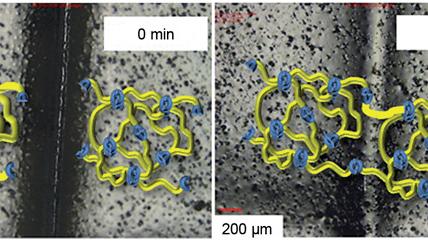UniversityOfReading
Latest

This plastic could make paint scratches a thing of the past
Self-healing plastics are nothing new. In fact, IBM stumbled across the discovery of one such polymer by accident not too long ago. But now there's a new Wolverine-like plastic stealing the headlines (okay, fine... 'science journal' headlines) and this time it hails from researchers at the University of Reading in the UK. The supramolecular polyurethane, developed with funding from the Engineering and Physical Sciences Research Council, reportedly repairs itself at body temperature (98.6 degrees F or 37 degrees C). The new material's unique properties allow it to "[flow] like a liquid" when its bonds are disrupted and reform, as its viscosity is lowered when damaged.

Supercomputer passes the Turing test by mimicking a teenager (update: reasons to be cautious)
After 64 long years, it looks like a machine has finally passed the Turing test for artificial intelligence. A supercomputer in a chat-based challenge fooled 33 percent of judges into thinking that it was Eugene Goostman, a fictional 13 year old boy; that's just above the commonly accepted Turing test's 30 percent threshold. Developers Vladimir Veselov and Eugene Demchenko say that the key ingredients were both a plausible personality (a teen who thinks he knows more than he does) and a dialog system adept at handling more than direct questions.

Nature-inspired nano-material builds a better electrode, points to greener future (video)
From the apple falling on Newton's head to batteries made out of root extract, scientists have long turned to nature for ideas. Following that tradition, the brainiacs over at the University of Reading have developed a new nano-material electrode coating based on the cellular structure of plants. Essentially a network of tiny wires, it features a larger surface area than flat electrodes, giving it the leverage it needs to convert more electricity in a smaller form factor. This could lead to cheaper cell production and good things for the future of green energy. "This novel electrode coating technique has applications for fuel cells in the newest generation of hybrid cars, photovoltaic cells, rechargeable batteries or battery production for a wide range of green technologies," said the university's Dr. Adam Squires. Hopefully this sort of technology makes its way to consumers in a timely fashion, but in the meantime we can't help but marvel at how this nature-inspired technology is being used to save its muse. Poetic, isn't it? To find out how the nano-material is made, check out the source and the video after the break.

British scientist becomes first human 'infected' with a computer virus
Sure, a cybernetic-filled, dystopian future may sound nice and cheery, but what happens when all your snazzy implants get infected with a computer virus? That's what one brave researcher at the University of Reading is attempting to find out, and he's now actually gone so far as to willingly "infect" himself in the name of science. As you might expect, however, this is all this very much a proof of concept, but Dr. Mark Gasson says that the infected RFID chip in his hand was indeed able to pass on the virus to an external control device in his trials, and he warns that the eventual real world implications could be far more dire. Gasson is particularly concerned when it comes to medical implants, which he says could potentially become infected by other implants in the body, and even pass on the "infection" to other people. Head on past the break for the BBC's report, and try not to be too startled by the Dalek in the room. [Thanks, Mark S]

UK researchers give robot a "biological brain"
It looks like a group of researchers from the University of Reading are making a solid run at the title of mad scientists of the year (in the best sense, of course), with them now boasting that they've developed a robot that's controlled by a "biological brain." That's not quite the sci-fi sight you may be imagining, however (though it's close), with it instead made up of some 300,000 neurons taken from the neural cortex of a rat fetus, which are contained in multi electrode array that packs 60 electrodes to pick up the signals generated by the cells and, in turn, control the robot. According to the researchers, they are particularly interested in using the robot to study how memories are formed in the brain, and how the brain stores specific data, which they hope will lead to a better understanding of Alzheimer's Disease, Parkinson's Disease, stokes, and other brain injuries. [Via Emerging Tech, New Scientist]



